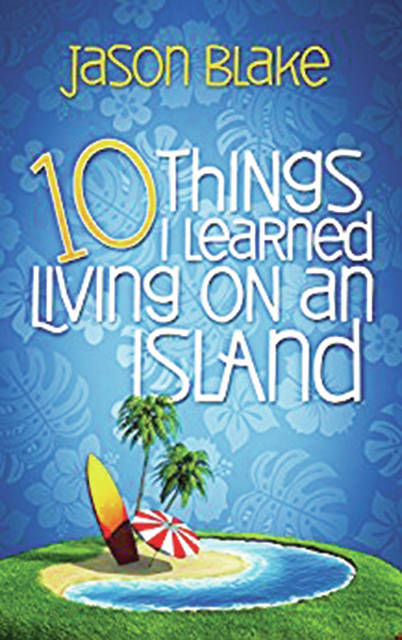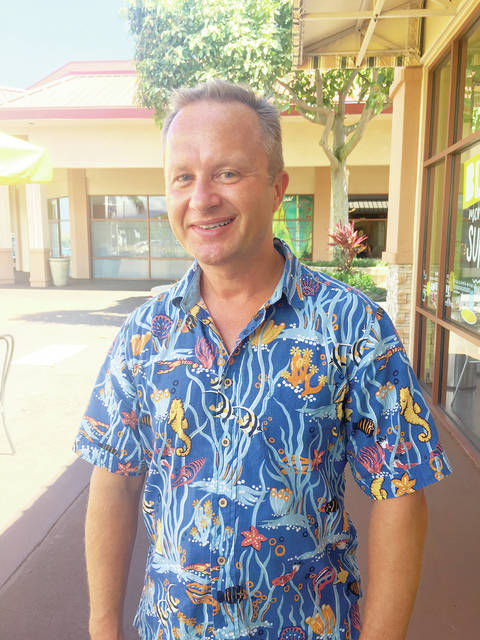LIHUE — Jason Blake is known around Kauai for being the Medicare Man. Every fall when Medicare open enrollment comes back around, he can be found at Walmart volunteering.
When the independent insurance agent isn’t saving people money on their medical bills, he spends his time on the board of Kauai Concert Association and heads Malama Pono’s Kauai Sings fundraiser.
And throughout the 12 years he’s lived and volunteered on the island, he’s raised nearly a quarter of a million dollars for Malama Pono. He has saved a substantial amount of money for Kauai’s kupuna, and he’s been writing.
“10 Things I Learned Living on an Island” was released in July and is Blake’s first book. In its 100 pages is the inspirational story of Blake’s stint on the Garden Isle.
The book’s message is a way to export aloha throughout the world.
In between meetings with distributors, Blake sat down with TGI to talk about life on Kauai and how it inspired the leap to becoming a published author.
How did you get the idea to write “10 Things I Learned Living on an Island”?
I’ve journaled for a long time and this idea kind of started popping up in my journaling maybe around a year ago. I stuck with it, and one chapter at a time I did a whole rough draft and put it in a drawer and forgot about it. It kept nudging me, so I guess, now this is it.
I moved here from Chicago so I’m an import. But I like to say that I’m as local as a haole can get here, not growing up here. We read the paper and know the challenges here, we know the local politics and the expensive milk and stuff like that.
But there’s something really special about living here. I loved Chicago, but living here there’s a different way we get along. Even when we fight, we fight more politely than some of the political stuff you’re seeing on the Mainland now.
One story is about Iniki. Even not having been here for it, you can tell the impact that Iniki had on this community. Who stayed? What were things like? That story is about how neighbors took care of each other.
That kind of thing is combined with the uniqueness of all the different cultures here — from the generosity of the Filipino people to the respectfulness of the Japanese. Lots of neat things pull us together in a nice way.
So, what’s the message of the book?
If there’s some message for the book, it’s about exporting aloha. It draws the parallel between an island community and the world. It dumbs it down.
Here’s this planet, and we’re surrounded by space. There’s a bunch of cultures, socioeconomic status and stuff like that. We have to learn to get along if we’re going to survive.
Guess what? That kind of happens on this island, and these are some of the things that we do that make that work. Imagine if we tried that on a larger scale.
At the end of the day, people here, even if you don’t get along, you still make nice and there’s this sense of we’re all in it together.
We don’t have everything perfect, we still have Kapaa traffic and things like that. But even if people can’t live here, if they can learn to just chill a little.
If there’s any insecurities about this book, it’s that it’s too simple, but maybe that’s what we need now.
We need to go back to basics on some certain things so that society can work, I would hope.
Maybe this will inspire at least one other person.
Do you have anything else coming out soon?
I have a few things rolling around but it has to percolate. If I go back to anything, it’s that series “The Artist’s Way” and what she says about waiting for your marching orders. For me I get my marching orders while journaling. So I wait on my marching orders that say “This is your next thing,” like this book — it started to hound me after a while.
What brought you to live on Kauai?
We started vacationing here and got addicted to it. That story is in the book and I won’t ruin it totally, but my spouse and I, we were a honeymoon couple on our first vacation. It was 2001 and we had two places we wanted to go, Egypt and Hawaii. That was just after Sept. 11 and we weren’t going to rush to Egypt. Hawaii was the other place that was mystical and far away and we chose it.
This story is in there too — I worked in banking at that point, and you know those people that think you’re really good friends, but you really don’t like them? I had this lady I worked with and I’d never met her but we talked on the phone.
She lived in Honolulu for a while. We’d decided to pick one island instead of seeing them all, and she said, “Don’t go to Kauai, it’s the place for romantics.” She said, “You need to go to Oahu, there’s a real city there.” And I was like, “She says Oahu, I’m going to Kauai.”
So we came here for 10 days and it was magical and we came back four or five times before we moved here. Except for Oahu we never saw any of the other islands. We felt a strong connection here. It was like the show “Lost.” The island was pulling us in.
How are you spending your time these days?
My main babies now are Kauai Sings and Kauai Concert Association.
I started the fundraiser Kauai Sings and we used to do it three times a year. We’re down to one time a year this year, but next year we’re trying to get back to doing it three times a year. That’s been a good thing for Malama Pono.
And the other thing that really pays the bills and has a social aspect for it is my work. At least 2,000 people on Medicare on this island know me. It’s great. You save auntie a hundred bucks a month on her drugs, it creates local street cred like nobody’s business.



